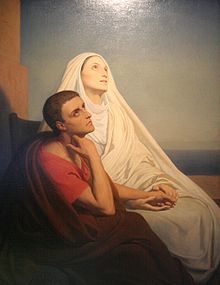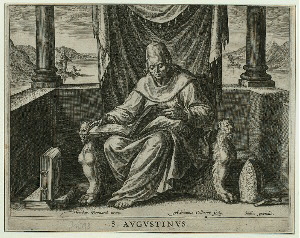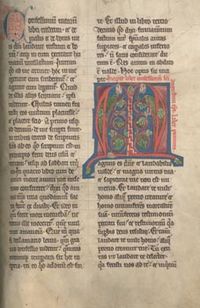
"Saint Augustine and Saint Monica" (1846), by Ary Scheffer.

St. Augustine, Sadeler, Jan, 1550-1600
Source: NYPL Digital Gallery

Augustine's Confessions
BPH Ms 83. Manuscript on vellum. Germany, first half 13th century.
*What does "self" mean - in Augustine's Confessions?
Does Augustine associate the self with----
--the heart?
--the mind?
--the soul?
--the face?
--the voice?
--the eyes?
--the ears?
--the nose?
--hair?
--the mouth?
--the breath?
--the stomach?
--the sex organs?
--musculature?
--hands?
--sight?
--touch?
--hearing?
--smelling?
--eating?
--not eating (dieting, fasting, starving)
--sleeping?
--shopping?
--crying?
--laughing?
--being born?
--dying?
What kinds of connections can you make between Augustine’s and Bunyan’s works?
What kind of self does Augustine imagine?
Book II.
Big question: What is the significance of the pear-tree episode
Other questions:
What role do women play in men's journey to salvation?
How does marriage demonstrate God's good thinking?
How can you characterize Augustine's saying that his soul broke out in ulcers?
What's the problem with friends?
If you have read Plato, where can you see traces of his thinking in Augustine?
What is the desire that cannot cloy?
Book VIII
Imagine Augustine’s Confessions as an allegory. What would the various characters be named?
What holds Augustine back from taking “the narrow path”? What “fetters” hold him?
What do you think Simplicianus means when he says that in the Platonists, “God and his Word are constantly implied"?
Who is Victorinus and why is he important in Augustine’s story?
What is the problem of the will? What is the force of habit? How are they connected?
Who is Antony and why is his story important to Augustine’s?
What is the significance of the garden in this book?
What is the “fallen condition”?
Notice the little “psychomachia” (between the “I” and the “old attachments”) in section 11. How does this way of imagining compare with Bunyan’s? What is happening to habit?
What do you make of the expression “the eyes of the heart”?
Why is the voice of the child important?
Notice that the figure of the child recurs. How many purposes does the child serve?
Why does Augustine tell his mother about his experience?
Book X
How does the mind know things?
--Sensory images?
--Facts?
--Principles and laws of numbers and dimensions?
--Emotions?
--God?
What is the function of memory?
--What is learning?
--What is thinking?
--What is implied by the images that Augustine uses for memory (e.g., field, cells, lairs, palace, cloisters, stomach for the mind)?
--To what larger issue is the problem of memory subordinated?
--How does Augustine define forgetting?
Why was it important for Augustine to learn from the Platonists?
Where is God?
What is the danger of gratifying the senses?
--In satisfying inquisitiveness?
--Which sense offers the greatest danger?
How does someone achieve “unity of the self”?
More questions to follow.
Book Xi
--What is Augustine's purpose for examining the nature of time?
--Notice Augustine's ambition: to seize the reader's mind so that the reader can apprehend eternity.
--What does he have to do to affect the mind of the reader in this way?
--What is wrong with the question "What was God doing before he created heaven and earth?"
--How do we get our awareness of time? "Where" does time occur? How are memory, perception, and expectation related?